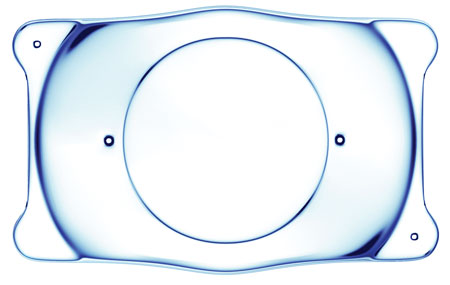 Intraocular Lens Implants Overland Park, KS
Intraocular Lens Implants Overland Park, KS
Dr. Cavanaugh has the training, experience, and unsurpassed technology to provide you with optimal refractive lens implant surgery results
An intraocular lens (IOL) implant is an artificial replacement for the lens of your eye, which can permanently restore your vision. Dr. Cavanaugh at Cavanaugh Eye Center is a leading refractive surgeon specializing in a variety of intraocular lens implants in Overland Park, KS. We are proud to offer an impressive selection of ocular lens implant supplement and replacement options for Cataract, Refractive Lens Exchange (RLE), and Implantable Collamer Lens (ICL) surgeries.
If you are interested in finding out if refractive lens implant or refractive cataract surgery can help to restore your vision, contact Cavanaugh Eye Center. We look forward to seeing you for your comprehensive consultation at our office in Overland Park.
Schedule a Consultation Today!
When Are Intraocular Lenses Used?
The lens of the eye is located behind the pupil. Its function is to focus light through the pupil and back to the retina so that we can see. The inherent power of the human lens largely determines the prescription of one’s eye and is partially responsible for making a patient myopic (nearsighted) or hyperopic (farsighted). In addition, the human lens can accommodate or flex to change its shape in order to focus on near and distant objects. Presbyopia describes the condition in which the human lens stiffens over time and causes difficulty reading for patients over 40 years old.
Refractive Lens Exchange (RLE) and Implantable Collamer Lens (ICL) are LASIK alternatives, and similar to LASIK, these surgeries are elective procedures designed to reduce or eliminate dependency on glasses or contact lenses. These procedures treat your nearsightedness, farsightedness, or presbyopia. Depending on the treatment, your natural human lens may be removed and replaced with an artificial lens implant (IOL) or a supplemental lens implant (ICL) may be used to optimize your vision. This is similar to what occurs during cataract surgery — when the cloudy human lens is replaced with an artificial lens re-establishing the clear focusing power of the eye.
RLE and cataract surgery replace the aging lens with an IOL, restoring your vision and eliminating the future possibility of cataract development. Unlike RLE and cataract surgery, ICLs are considered ‘phakic IOLs’ and do not replace the eye’s natural lens but rather supplement it. ICL is a type of phakic IOL that provides sharp, high-definition vision and is particularly useful for patients who are too myopic for LASIK but are not ideal candidates for RLE.
In the past, patients required glasses for close-up vision after cataract and RLE surgery. Now, at Cavanaugh Eye Center, there’s a better solution. Our premium intraocular lens implants (IOLs) in Overland Park, KS, improve vision for refractive and cataract surgery patients but also treat presbyopia, essentially turning back the clock to give you the ability to see up close as well as at a distance without glasses. The elective upgrade to a Premium Presbyopia-correcting IOL is not covered by medical insurance or Medicare and will be the patient’s financial responsibility.
IOL Options
Technological advancements offer us wonderful choices of IOLs, but the variety of options can sometimes be confusing and overwhelming. However, there is no need to worry when you come to Cavanaugh Eye Center. From standard to premium IOLs, Dr. Cavanaugh will recommend the best lens implant for you based on exam findings, discussion during the exam, and your completed vision questionnaire.
We offer four broad categories of intraocular lenses in Overland Park:
Single-focus lens implants provide excellent distance vision but do not correct astigmatism or presbyopia. All patients choosing this type of lens will need reading glasses for near work. Monofocal lenses are best for patients who do not mind wearing glasses most of the time for distance and reading. These are the least expensive option as they are covered by insurance for cataract patients.
- Single-Focus Lens Implant with “Blended” Monovision – Using a single-focus (monofocal) lens implant, the dominant eye is focused for distance and the non-dominant eye is biased for near. This is achieved by leaving the non-dominant eye slightly nearsighted so near objects at arms’ length are in focus. As a trade off, the distance vision in the reading eye is somewhat blurry. Patients will need reading glasses for small print or distance glasses for driving. This is strongly recommended for functional near vision to allow visualization of food on your plate, dashboard, cell phone, watch, computer screen, etc. There is no additional charge outside of insurance coverage for this option.
- Enhanced Single-Focus Lens Implant – The new Tecnis Eyhance is a monofocal IOL with a unique shape designed to slightly extend the depth of focus and provide patients with an improvement in intermediate vision over a standard monofocal IOL. Due to medical insurance coverage, Eyhance is only available for patients who select additional upgraded services such as limbal relaxing incisions or blade-free laser-assisted surgery.
Astigmatism is a condition where the cornea (the front window covering of the eye) is oval rather than round, which results in blurred vision and ghost images around objects. In order for light to focus precisely, the cornea needs to be as round as possible. In general, low astigmatism is corrected with a monofocal IOL while high astigmatism is corrected with a toric IOL. Insurance does not cover the cost of astigmatism surgery.
Toric IOLs have your astigmatism power incorporated into the lens optic and provide the most precise way to reduce or eliminate astigmatism, while at the same time correcting cataracts and/or a patient’s nearsightedness, farsightedness, or presbyopia. These IOLs are for cataract and refractive lens patients with pre-existing astigmatism who want spectacle reduction for distance vision or a reduction in the thickness of glasses.
Traditional toric IOLs are monofocal IOLs and do not correct for presbyopia (natural loss of reading vision over time). Exciting advancements in IOL technology have produced multifocal toric IOLs that combine astigmatism and presbyopia correction into the same lens implant. Alcon’s PanOptix® Trifocal Toric and Johnson & Johnson’s Tecnis Synergy Toric IOLs are options that provide an expanded range of vision from distance to near for those who need correction from a toric lens implant but desire greater freedom from reading glasses.
Multi-focus lenses are the implants of choice for patients with presbyopia wanting the greatest freedom from glasses for a full range of vision. For this group of patients, these implants can be the best investment they ever make. Insurance does not cover the additional cost of these lens implants.
- Multifocal Lens Implants – Multifocal IOLs have a small bifocal or trifocal built into the lens that allows for functional vision at all distances. Unlike bifocal glasses, you do not have to move your head to see through the different zones or lines of correction. These IOLs provide the best opportunity for excellent vision at all distances and the most independence from glasses. The most common bifocal IOLs are the Tecnis® Multi-focal and ReSTOR® Multi-focal and these provide two focus points, distance and near. The revolutionary Alcon PanOptix® Trifocal and J&J’s Tecnis Synergy Trifocal IOL use new technology to achieve trifocal vision that provides all three points of focus: distance, intermediate, and near. As mentioned previously, these IOLs come in a toric variety that can correct astigmatism, too! The main side effects of these IOLs are temporary halos seen around lights (such as headlights) at night due to a reflection off of the multifocal circles on the IOL. These halos do not prevent you from driving at night and usually dissipate and improve after 90 to 180 days.
- Focusing or “Accommodating” Lens Implants – The Crystalens is a uniquely designed lens implant that provides dynamic focus for “accommodation.” The lens implant mimics the movement of the younger, natural human lens by using the eye’s own focusing muscles to flex the lens. Compared to multifocal lenses, the “accommodating” lenses have fewer halo side effects and provide excellent focus for distance as well as intermediate or computer distance. Small print at near is more difficult to achieve with this lens type and is variable depending on the strength of your focusing muscles. Crystalens IOL patients should avoid excessive reading for the first 2 weeks after surgery to allow the IOL to seat properly. Reading glasses of +1.00 or higher should be used during this time. The Crystalens Trulign® is the first IOL that is engineered to correct both astigmatism and presbyopia. It incorporates a toric astigmatism correcting optic into the flexible platform of the Crystalens to achieve simultaneous correction of both problems. This lens allows patients with higher levels of astigmatism to gain more independence from both distance and reading glasses.
The Tecnis Symfony, Tecnis Symfony Toric and the new Alcon Vivity intraocular lens implants (IOLs) are “Extended Depth of Focus” products. These lens implants utilize two separate technologies that allow patients multiple points of focus. It is easy to think of this class of presbyopia-correcting IOLs as a hybrid between a true multi-focus and accommodative platform lens. EDF IOLs provide a greater depth of high-quality vision when compared to monofocal lens implants. In addition, patients experienced fewer side effects of glare and halos when compared to traditional multifocal IOLs. EDF technology provides patients another great option to improve their range of vision and reduce their dependence on glasses and contacts.
Financing Your Lens Replacement Eye Surgery
There are several payment options available for your IOL procedure and we do all we can to make refractive implants affordable for our patients. We work with insurance companies whenever possible, and we accept payments from HSA and FSA plans. We also partner with CareCredit to provide the option of monthly payments that fit into many budgets.
At Cavanaugh Eye Center, our fees for refractive surgery are global fees, meaning that they include everything associated with your procedure. We charge a fee for your pre-operative consultation that includes all the scans and measurements for surgery, but this fee is credited back towards the cost of your surgery. The procedure fee includes the surgeon fee, operating room charges, surgical supplies and all of your post-operative visits related to the procedure for the first year. Office visits unrelated to the procedure will be charged as usual. If you are in the 10-15% of patients who require a LASIK enhancement procedure, this is included in the first two years and then provided for a discounted fee thereafter.
Though IOL implants are life-changing, it is considered to be an elective surgery by insurance companies and is rarely ever covered by insurance. The patient is responsible for the fees, and payment in full is required prior to the procedure or at check-in at the front desk on the day of surgery.
Payment in full is required at the time of service. We accept cash, check, Visa, MasterCard, Discover, and American Express. We do not provide financing in house for elective IOL upgrades but financing arrangements can be made through CareCredit.
CareCredit offers a full range of payment plans so you can find one that works best for you. With the popular ‘Deferred Interest’ plans there are no interest charges if you pay your balance in full within the specified time period. CareCredit offers 12, 18, or 24 month plan options with low monthly payments available. You apply via www.carecredit.com and your specific rates will depend on your credit rating. The process is simple and you will have a credit determination quickly. Our surgical counselors can provide you information about CareCredit and help guide you through the process.
Contact Us to Learn More About Intraocular Lens Implants in Overland Park, KS
At Cavanaugh Eye Center, we believe patient education is vital to the success of our procedures and the happiness of our patients. We spend a tremendous amount of time and effort to ensure that our patients are well informed about their IOL options. We look forward to meeting you at your consultation and thank you in advance for trusting your surgical care to us! Contact Cavanaugh Eye Center today to learn more about intraocular lens implants in Overland Park!



